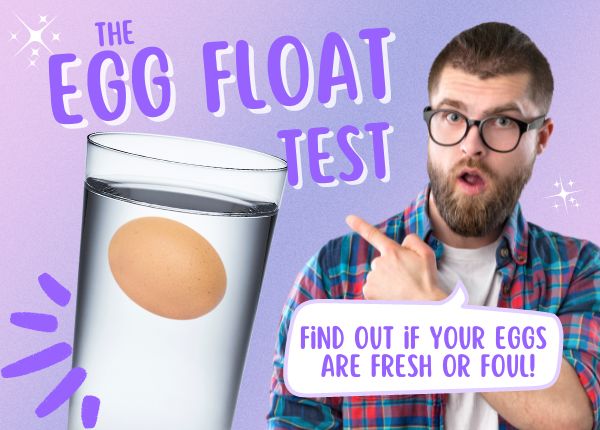
Egg anxiety is a thing! Why is it that we’re always doubting how fresh our eggs are?
The repercussions of eating bad eggs are not pretty. We won’t go into too much detail…you know what I mean. It’s totally natural to want to check your eggs for freshness before you eat them. You’d be crazy not to.
With store-bought eggs, the date on the carton will tell you how fresh your eggs are, and with farm eggs or eggs laid by your own hardworking backyard chickens, you’ll no doubt have a dating or storage system in place.
However, those eat-or-bin doubts still creep in. It happens to us all.
We can use our eyes, our noses, and even our ears to judge the freshness of an egg. We can use our sense of taste too, but nobody wants to take it that far.
The egg float test is by far the most popular way to check if eggs are good or bad.
Does the egg float test work? Yes, it does. However, you might be doing it wrong!
They say that if in doubt you should chuck it out. Sure. But just how many edible eggs are going to waste because of that doubt?
I always float-test eggs before I cook them, but would I bank my belly health on the egg float test alone? Not really. Let me eggs-plain…
FAQs Answered here include…
What Is the Egg Float Test?
How To Do the Egg Float Test
Is The Egg Float Test Reliable?
Why Do Older Eggs Float?
Why Do Fresh Eggs Sink?
Should You Use Salty Water for The Egg Float Test?
Can I Trust the Egg Float Test?
Can I Eat an Egg That Floats?
Are Older Eggs Safe to Eat?
What Is a Bad Egg?
Are Use-By Dates on Eggs Reliable?
How Long Should Eggs Last?
5 Ways to Test Eggs For Freshness
THE EGG FLOAT TEST
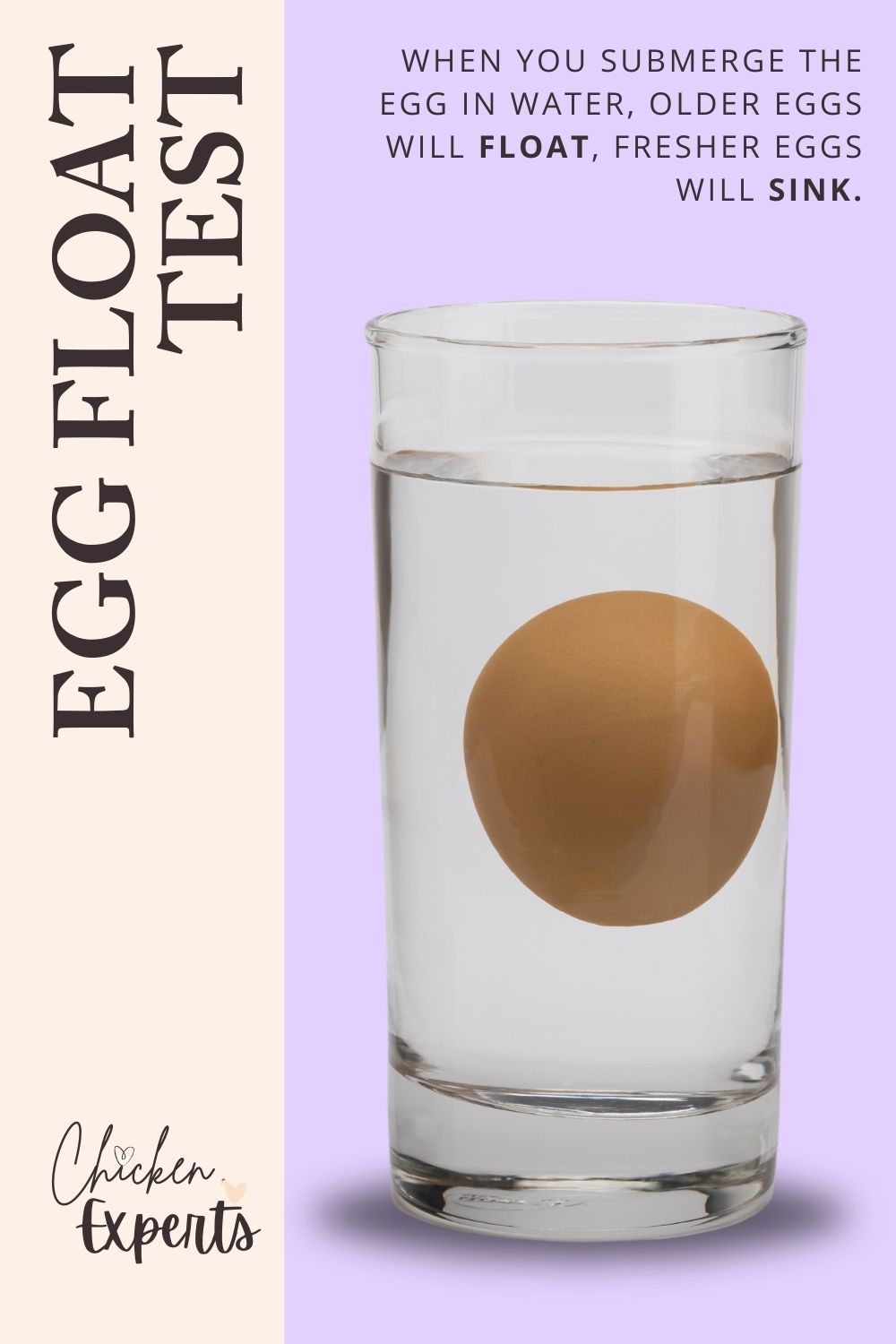
What Is the Egg Float Test?
The float test is a fast and easy way to check how old an uncooked egg is. It can help you decide whether the egg in question is good to eat or not.
When you submerge the egg in water, older eggs will float, fresher eggs will sink, and the position of a sunken egg in the water💧 can even help estimate just how fresh the egg is.
How To Do the Egg Float Test
Egg shells must be porous so that baby chicks can breathe. As eggs age, their shells get more porous allowing increasing amounts of moisture from inside the egg to evaporate. When that happens, the air sack inside the egg grows larger to fill the void.
The older the egg🥚, the more air it has, and the more it floats. This means that you can use an egg’s buoyancy and position in the water to hazard an eggucated guess at its age.
- Eggs which lay horizontally at the bottom of the bowl or glass are nice and fresh.
- If the pointy end of an egg lifts off the base on an angle, they are likely to be a day or two old.
- If the pointy end of an egg lifts all the way up - so they’re sitting upright on the base of the bowl - then it's over a few days old: past its best but safe to eat (and perfect for hard boiling!)
- Eggs that bob around mid-water are around a week or so old.
- Eggs that float to the top are often considered too old to eat.
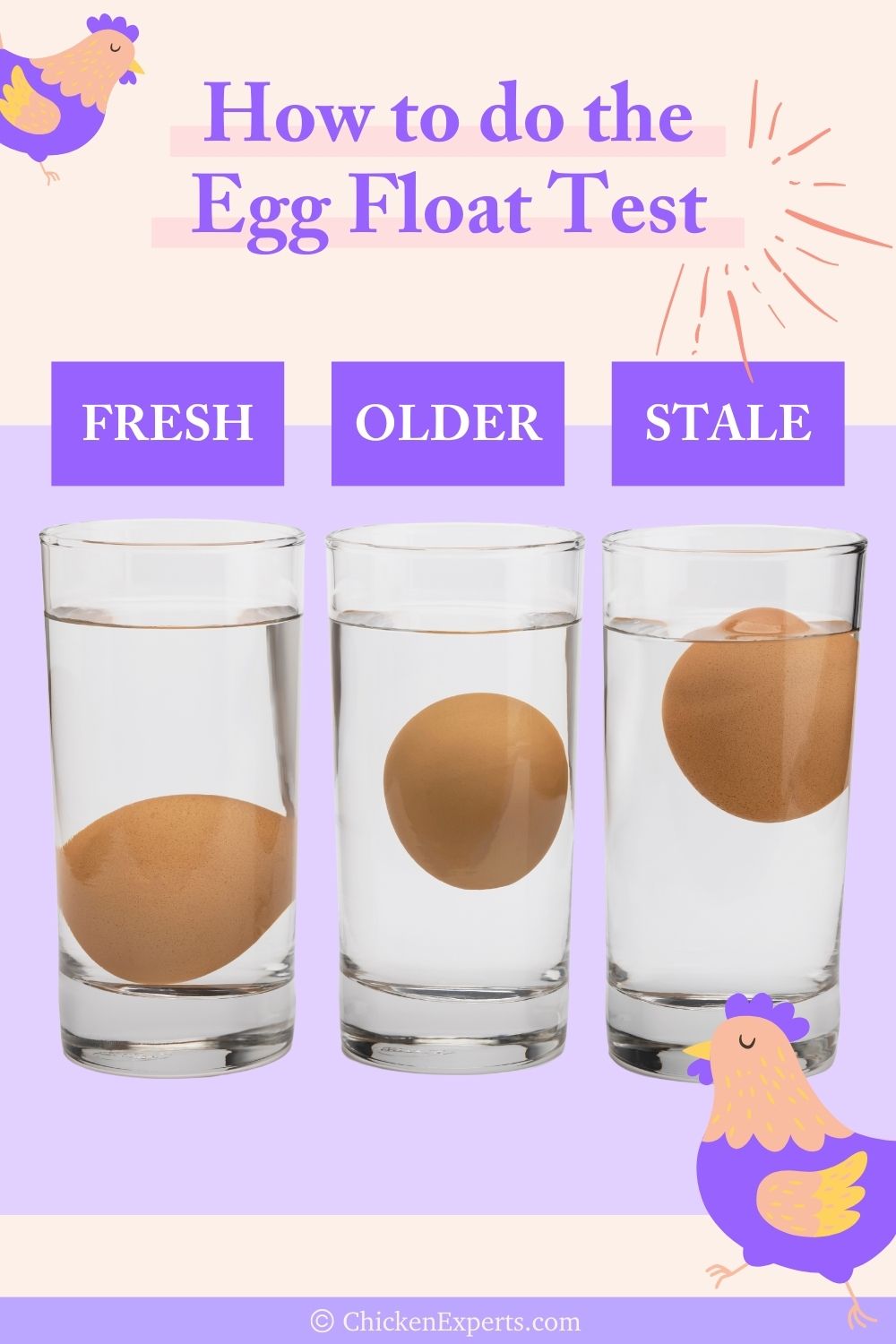
Is The Egg Float Test Reliable?
The egg float test is a fairly reliable way of knowing a fresh egg from an older egg, but it isn’t 100% trustworthy. That said, neither are use-by dates.
You can bank on an older egg floating, and you can almost bank on a fresh egg sinking. There’s always a small chance that a fresh egg could float for a reason other than age. Some keepers say that eggs that are fresh from the under a birdy’s bottom and still warm tend to float.
“We found that candling and egg flotation are both viable methods for estimating hatch dates of bobwhite clutches during an initial measurement when a nest is discovered. When an entire clutch is measured accuracy can be within 1 day of the actual estimated hatch date” (NBCI)
Why Do Older Eggs Float?
Older eggs float because internal fluids have had time to evaporate and air has penetrated through the porous shell and filled the remaining spaces. This is known as the air sack. It’s this air sack that makes the egg float in water.
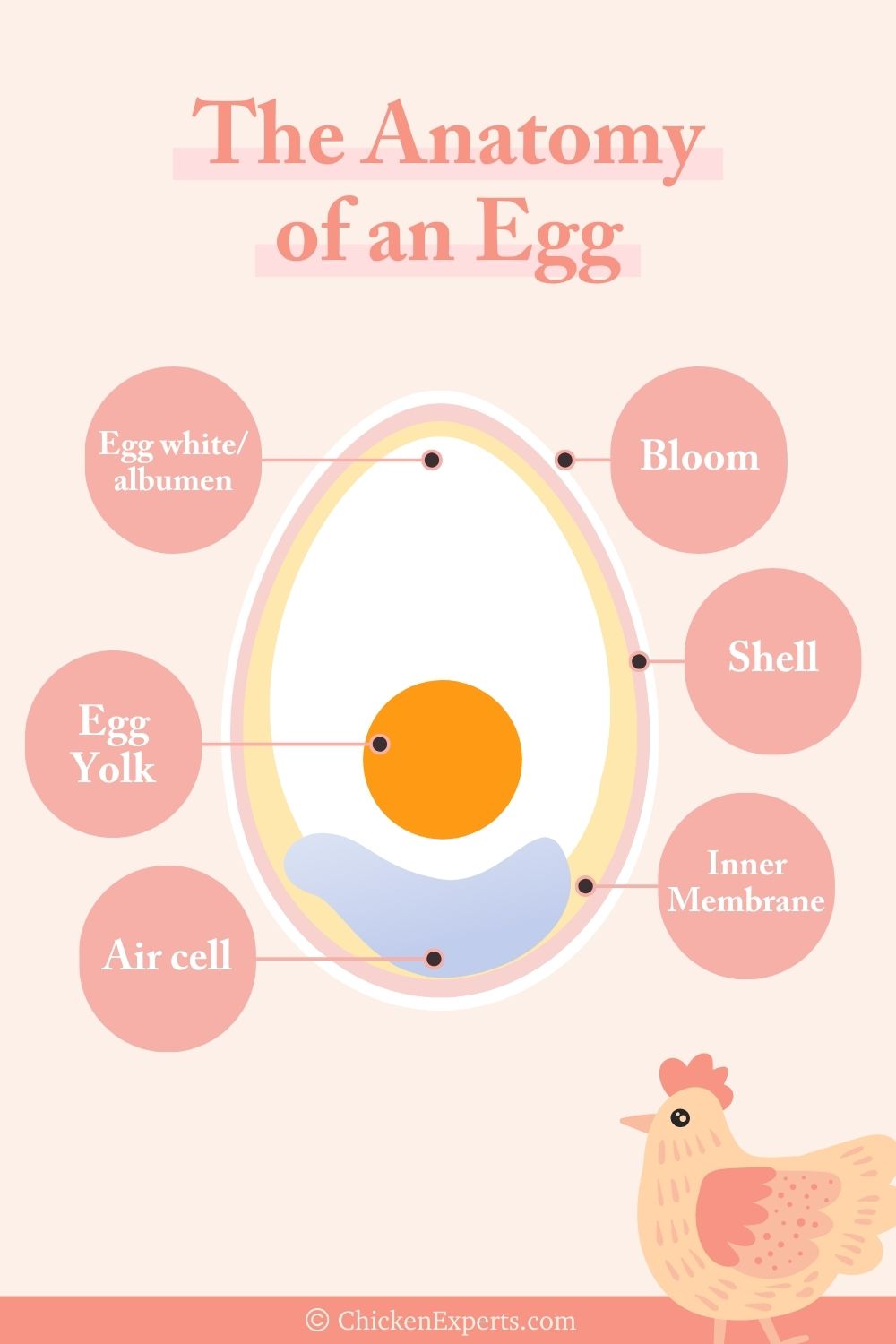
Why Do Fresh Eggs Sink?
Fresh Eggs sink because most of the egg mass is made of egg yolk and white, which are heavier than water. Poultry physics in action!
Should You Use Salty Water for The Egg Float Test?
Some people add a teaspoon of salt per glass of water when doing this test to get clearer results. The salt makes eggs more buoyant, so they’re more likely to float. This means your egg will simply float or sink. There are no grey areas or uncertainty! If you prefer to play it safe, then add a little salt.
Can I Trust the Egg Float Test?
You can trust the egg float test to estimate the age of the egg. However, is that really what you want to know?
A fresh egg isn’t necessarily safe to eat (although, they usually are), and an older egg isn’t necessarily a bad egg.
The egg float test cannot tell a bad egg from a good egg. I tend to use the test to rule out any ‘floaters’, but then proceed to crack ‘em open and take a closer look.
Can I Eat an Egg That Floats?
A floating egg will have an enlarged air sack, meaning it is not a freshly laid egg. That doesn’t mean it’s unsafe or unpleasant to eat. An older egg is not the same thing as a bad egg.
“An egg can float in water when its air cell has enlarged sufficiently to keep it buoyant. This means the egg is older, but it may be perfectly safe to use.” (Egg Safety Center)
If you LOVE FRESH EGGS and you don’t like waste…ever thought of keeping chickens of your own?
The easiest way to get started is to take a fast and fun chicken-keeping course to help you decide what types and breeds of chicken would work for you. Take a peep here!
Are Older Eggs Safe to Eat?
We’ve got to stop being ageist with our eggs. A bad egg and an older egg are not the same.Fresh eggs can be bad and older eggs can be good.
Pick your freshest eggs for poaching, frying, and scrambling, but don’t waste older eggs just because they’re not freshly laid.
Did you know that eggs can last for months on the counter if you don’t wash them, or that the top chefs prefer older eggs for certain recipes?
“Don't toss your eggs just because they're close to expiring. Older eggs are great for making meringue—they whip up better than fresh eggs. You can also hard-boil older eggs to extend their shelf-life for a little longer. Hard-boiled eggs can be stored in their shells in the fridge for another week…Then use your hard-boiled to make egg salad or deviled eggs.” (ThePioneer Woman)
What Is a Bad Egg?
A bad egg is an egg that’s infected🦠. Most commonly – with eggs – we’re anxious about eating an egg that carries Salmonella.
“Salmonella bacteria cause the foodborne illness salmonellosis. Named after Daniel E. Salmon, a veterinarian who spent his career studying animal diseases for the U.S. Department of Agriculture, Salmonella bacteria have been known to make people sick since 1885.” (US Food & DrugAdministration)
Are Use-By Dates on Eggs Reliable?
The dates provided on store-bought eggs are a handy guide, but they’re often over-cautious, resulting in waste. Also, not every egg stays fresh until the date on its shell.
To waste less and enjoy more, we’ve got to be able to confidently check our eggs for freshness. Tossing a perfectly good egg into the trash just because it says so on the box is madness!
How Long Should Eggs Last?
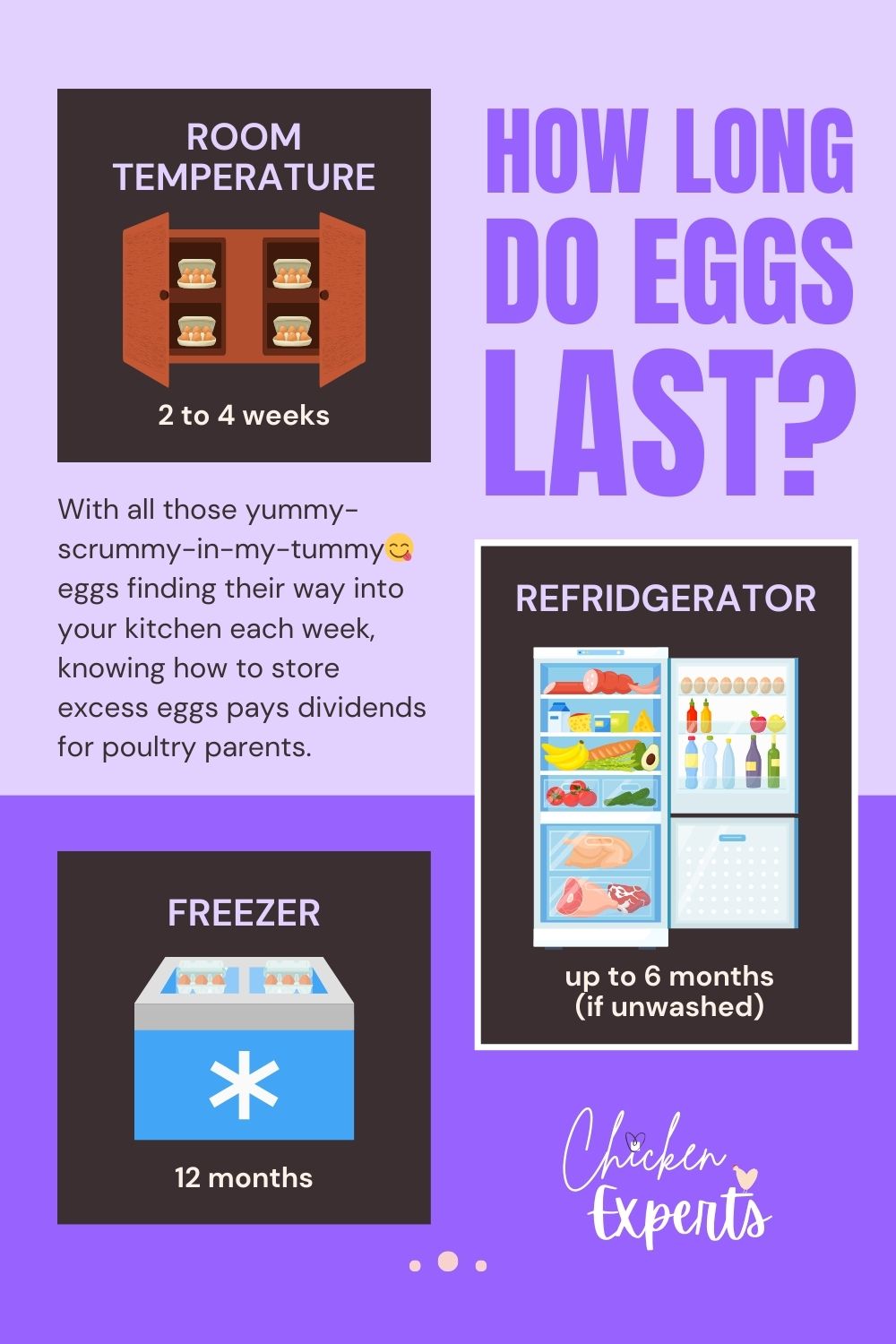
Freshly laid, unwashed eggs will last for at least 2-4 weeks at room temperature, up to 6 months in the refrigerator, and up to 12 months in the freezer.
Store-bought and washed eggs don’t last as long, since they’ve been robbed of Mother Nature’s protective shield – the bloom.
Egg-scatly how long your yolks stay yummy depends on how you prepare and store them. Find out here how to store your eggs and keepthem fresh for longer.
Still Tempted to Chuck That Chicken Egg? STOP!
There’s more than one way to boil an egg, and there are five ways to test them for freshness!
The USDA (United StatesDepartment of Agriculture)estimates that 30-40% of the country’s annual food supply is wasted. Utterly Bonkers.
The float test isn’t the only way to check if an egg is fresh. Click here to for all FIVE ways to check if eggs are fresh or not. Here’s what you’ll learn:
1. THE SNIFF TEST – Find out why rotten eggs smell
2. THE EGG WHITE TEST – Are Cloudy Egg Whites Safe to Eat?
3. LISTEN UP CHUCK! - Can you hear if an egg has gone bad?
4. EGG CANDLING – Not just for chicken breeders!
5. The Egg Float Test – More on this matter!
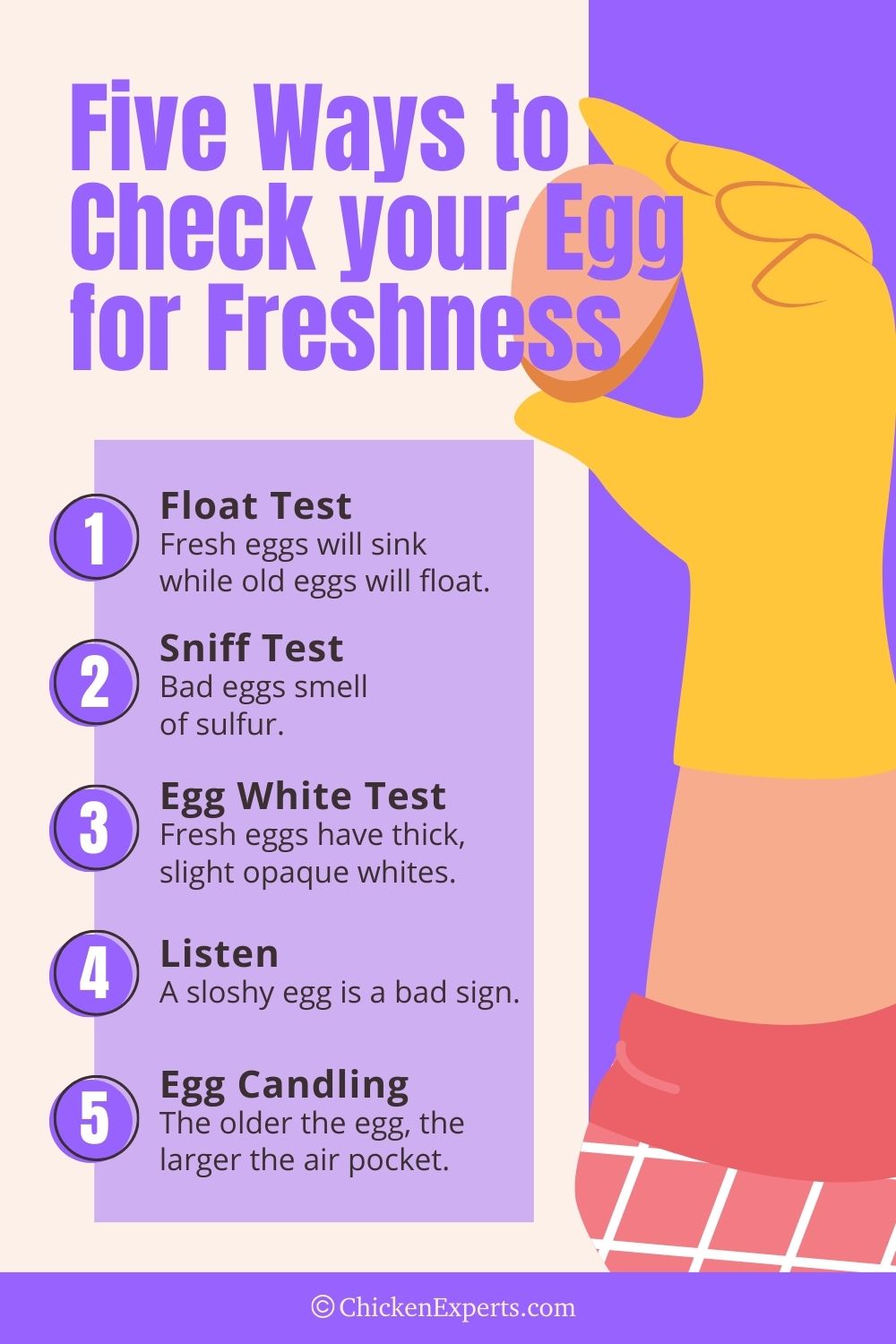
ANY EGG-STRA IDEAS?
Share your eggy testing tips in the comments!
The egg float test isn’t a myth, it’s physics. Interpreting the results the right way is what will save you from unnecessary waste or tummy aches.
If you’ve caught an egg straight from under Florence’s feathery bottom, then you can confidently crack on with your cooking knowing that you have a fabulously fresh egg. If your egg’s date of lay isn’t so clear, then the egg float test is the perfect way to check it for freshness. But please, don’t stop there. Crack it open, look, listen and lean in and sniff!
Keeping chickens for their eggs is all about enjoying a sustainable lifestyle. Making the right decisions around which chicken breeds you keep and how you care for them will keep costs down and productivity high.
The average emergency vet call-out costs $250…ouch! Knowing how to prevent poultry problems before they take root in your coop can save you a lot of egg-spence. That’s not to mention saving you all the worry and the heartache of a poorly pet.
Investing in your chicken-keeping know how is much more frugal than spending a fortune on a fancy chicken feeder. Chickenpedia’schicken-keeping courses offer an easy, affordable, and dependable source of information to help you make the most of your chicken-keeping venture with less expense, more fabulously fresh eggs, and more feathery fun!











Leave a comment (all fields required)